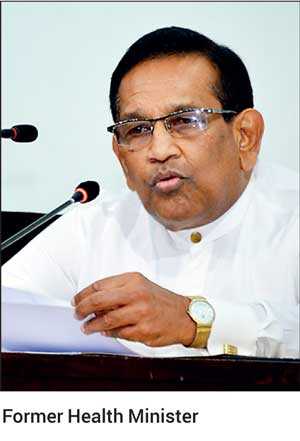Saturday Feb 21, 2026
Saturday Feb 21, 2026
Friday, 13 March 2020 00:02 - - {{hitsCtrl.values.hits}}
 The Samagi Jana Balawegaya (SJB) yesterday charged that the Government has failed to maintain adequate stocks of medicine at public hospitals, and this could further hamper health services that are already challenged with COVID-19.
The Samagi Jana Balawegaya (SJB) yesterday charged that the Government has failed to maintain adequate stocks of medicine at public hospitals, and this could further hamper health services that are already challenged with COVID-19.
Speaking at a press conference held yesterday, former Health Minister Dr. Rajitha Senaratne alleged that medicine needed for critical care and illnesses such as diabetes, cancer and heart disease was running low. He was joined by former parliamentarian Sujeewa Senasinghe.
“Never in the history of Sri Lanka have we had such a shortfall of medicine stocks, 220 essential medicines and a total of 400 medicines which are issued on a daily basis from Government healthcare institutions have run out of stocks or depleted to unprecedented levels,” Dr Senaratne alleged, pointing out that the previous Government had substantially reduced prices of several medicines, especially ones used to treat cancers and kidney disease.
“Today the medication used for dialysis of kidney patients are in short supply, if you go and check at the Maligawaththa clinic, when I was Minister, we could conduct dialysis on 45 patients a day, today, less than 20 are be treated due to the availability of the medicine,” he said, pointing out that patients were queuing outside awaiting dialysis.
Both Senasinghe and Senaratne both raised concerns that health sector watchdogs, unions, and the media were not paying attention to the prevailing situation. “Where is the so called Government Doctors Union today? Why are they silent?” he questioned, recalling that the union conducted many strikes when he was in office, citing lack of medicines.
Dr. Senaratne claimed that the present Government was sidestepping tender regulations and trying to purchase large stocks of medication from local purchases rather than buying in bulk directly from the supplier.
He alleged that the move by the Government to do so opened the door for corruption in the pharmaceutical sector. He also alleged that the present Government had suspended the universal health insurance system introduced by the 2015 Government, which covered all schoolchildren. Senasinghe charged that the Government should have adequate savings, since they have discontinued many of the benefits given to the State sector by the UNP-led Government of 2015. “They have with one Cabinet paper suspended overtime payment, halted increments to pensions, including that of disabled veterans, and cancelled low interest loan schemes,” Senasinghe said, pointing out that the savings from such suspended expenditure must be with the Treasury.
“So why are they asking to amend the Vote on Account? We made sure there is enough money for Government business till April. Therefore the Government must explain what they intend to do with the increased borrowings,” he argued.
Responding to a question on whether the Government will reduce fuel prices, Senaratne argued that the fuel price formula introduced by former Finance Minister Mangala Samaraweera, though criticised by many, should have been kept by the Government, as that would have facilitated the reduction of fuel prices. “They clearly don’t want to pass on the benefits of the reduction to the public, they want to fill Government coffers,” he stated.